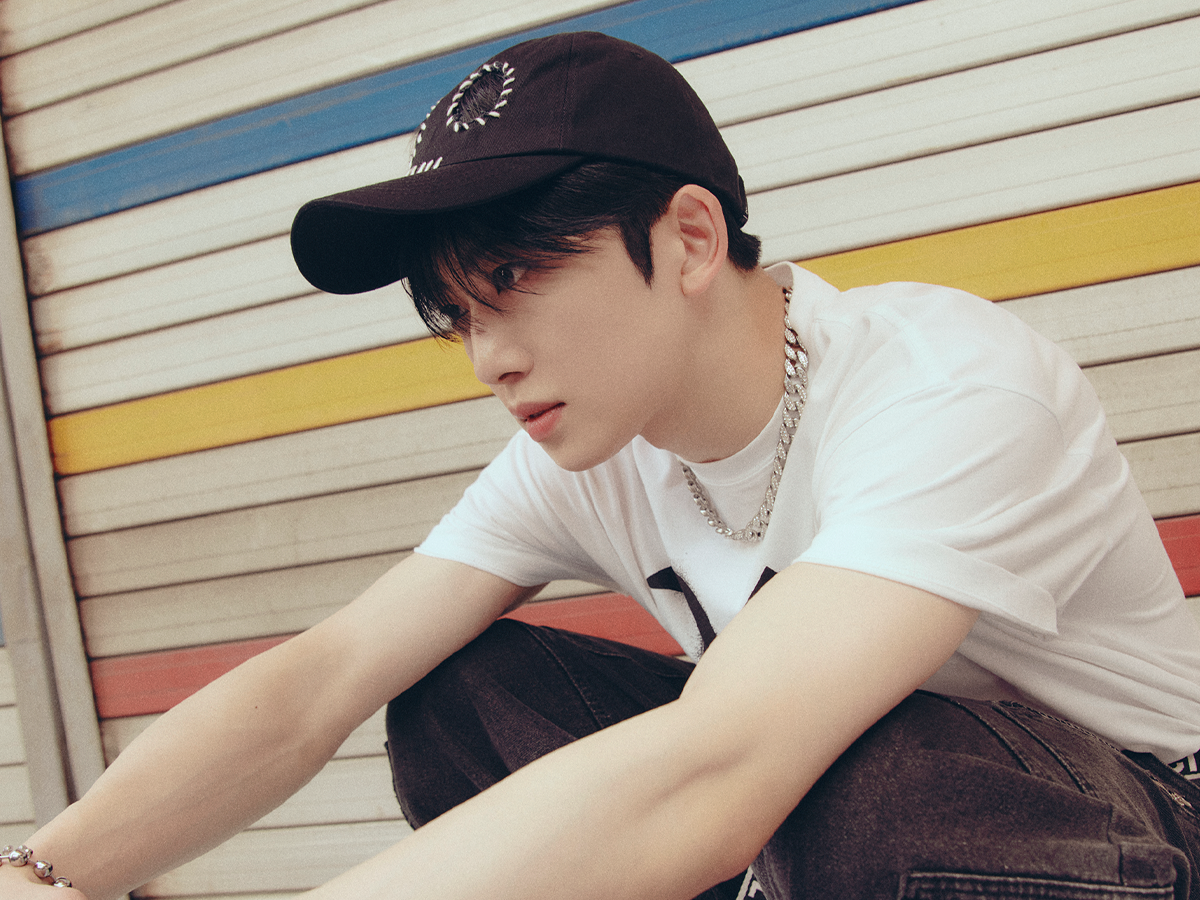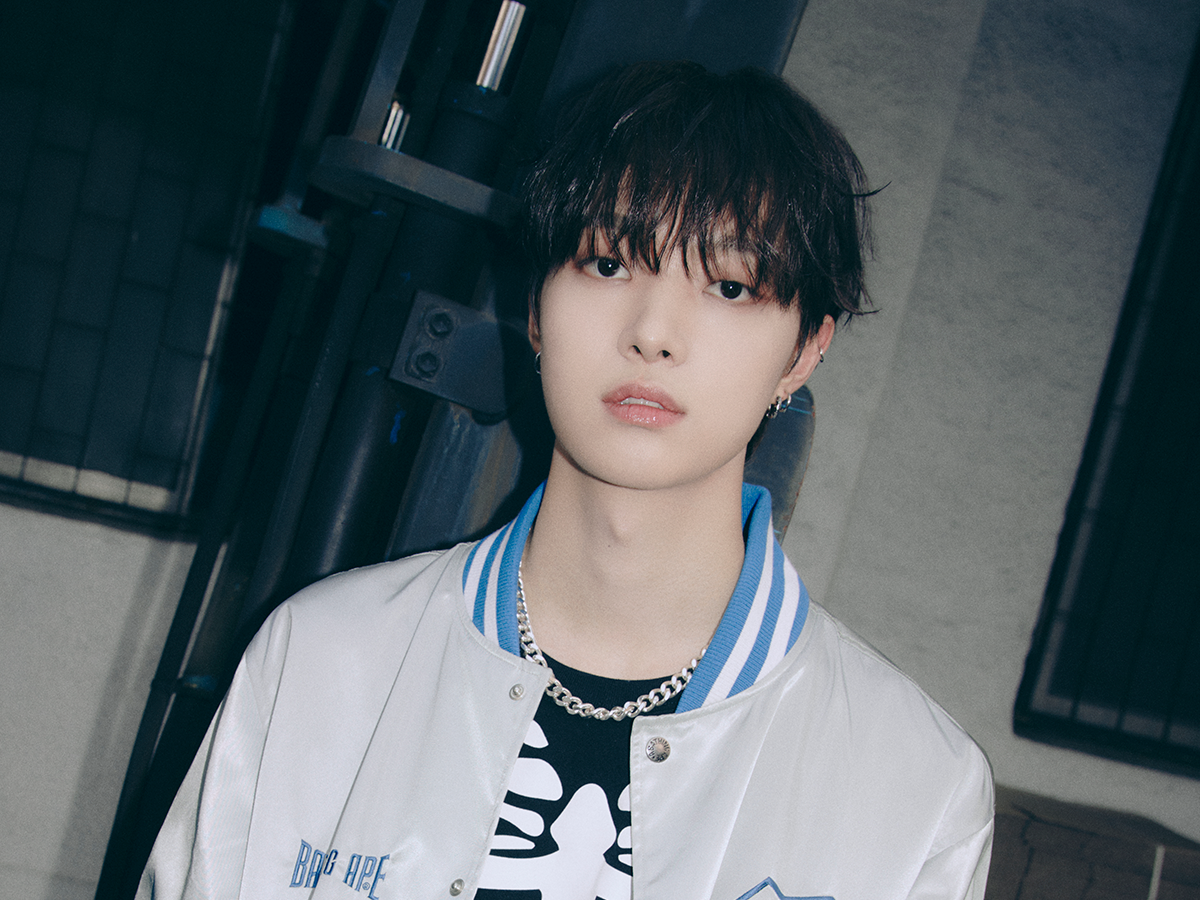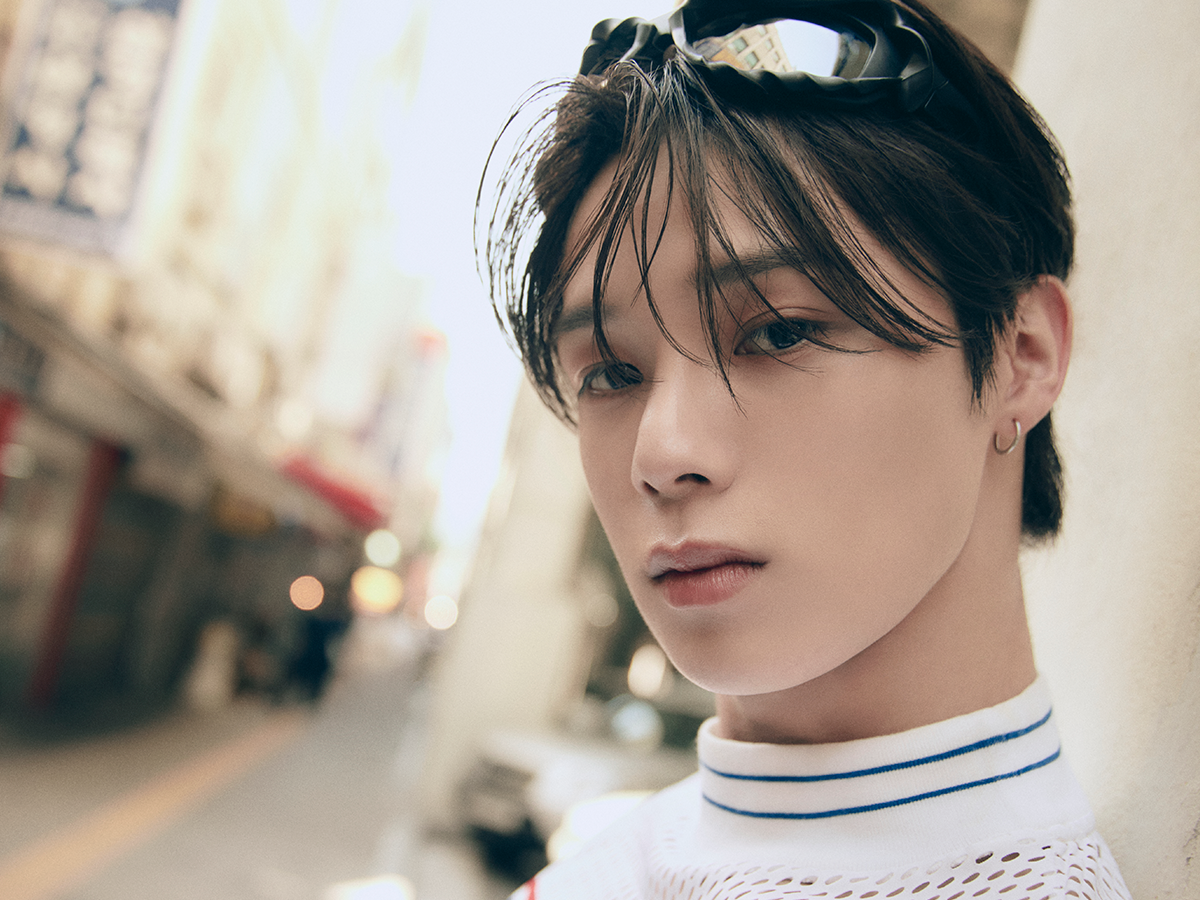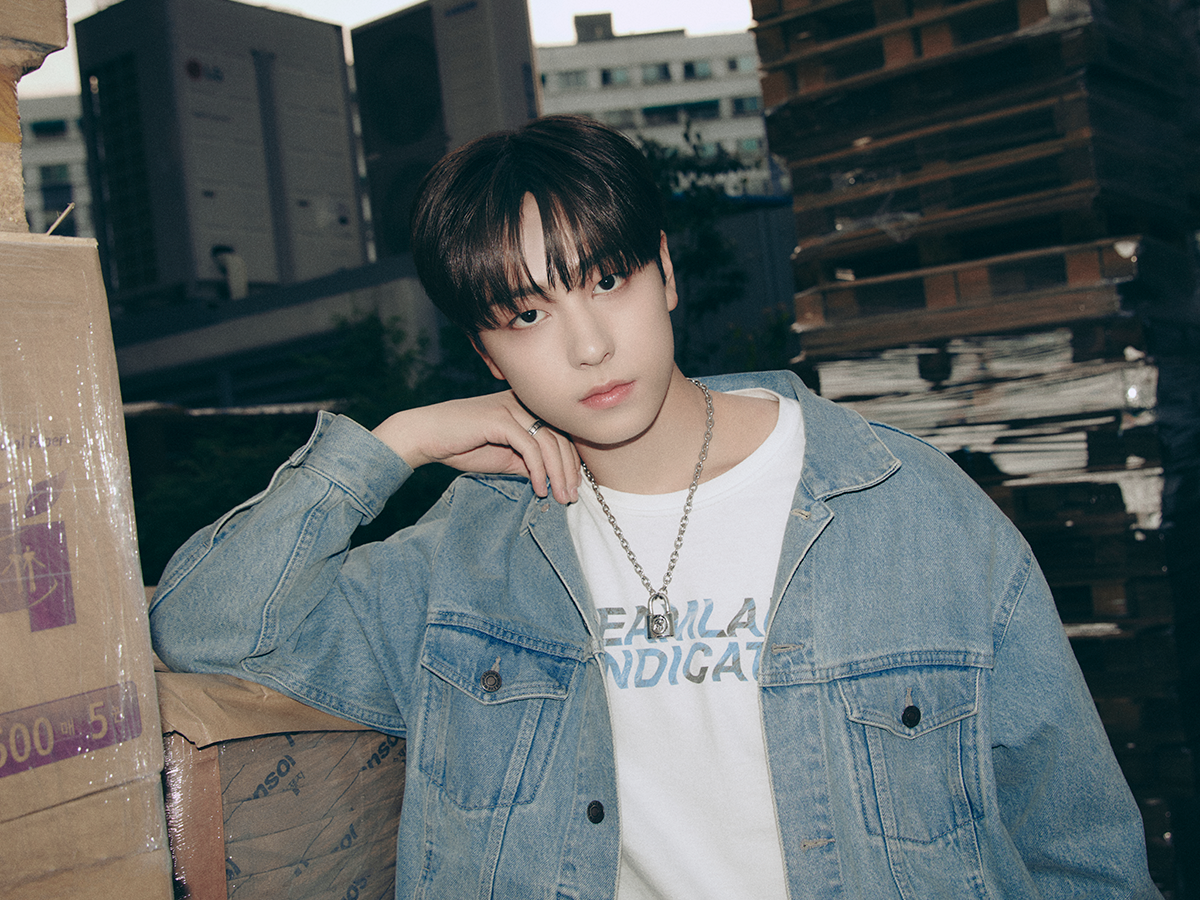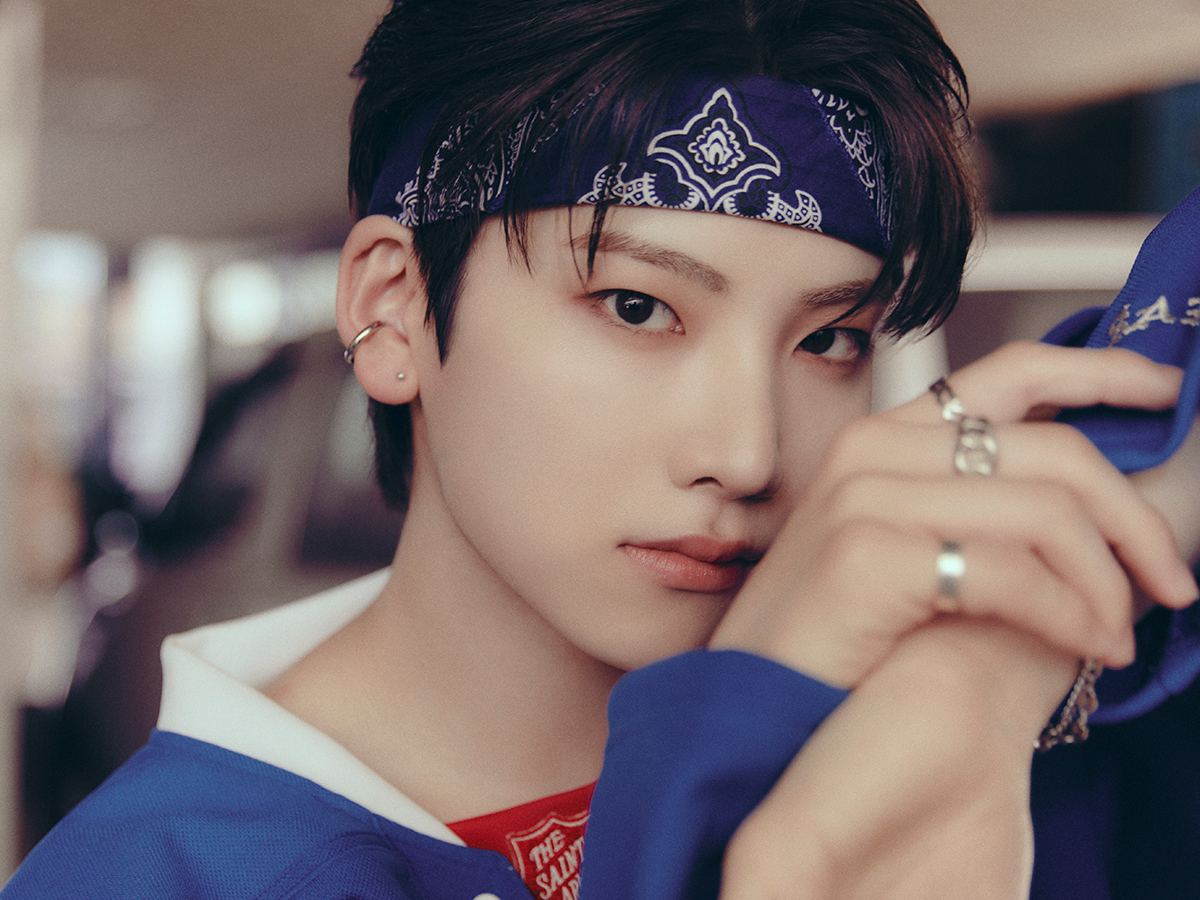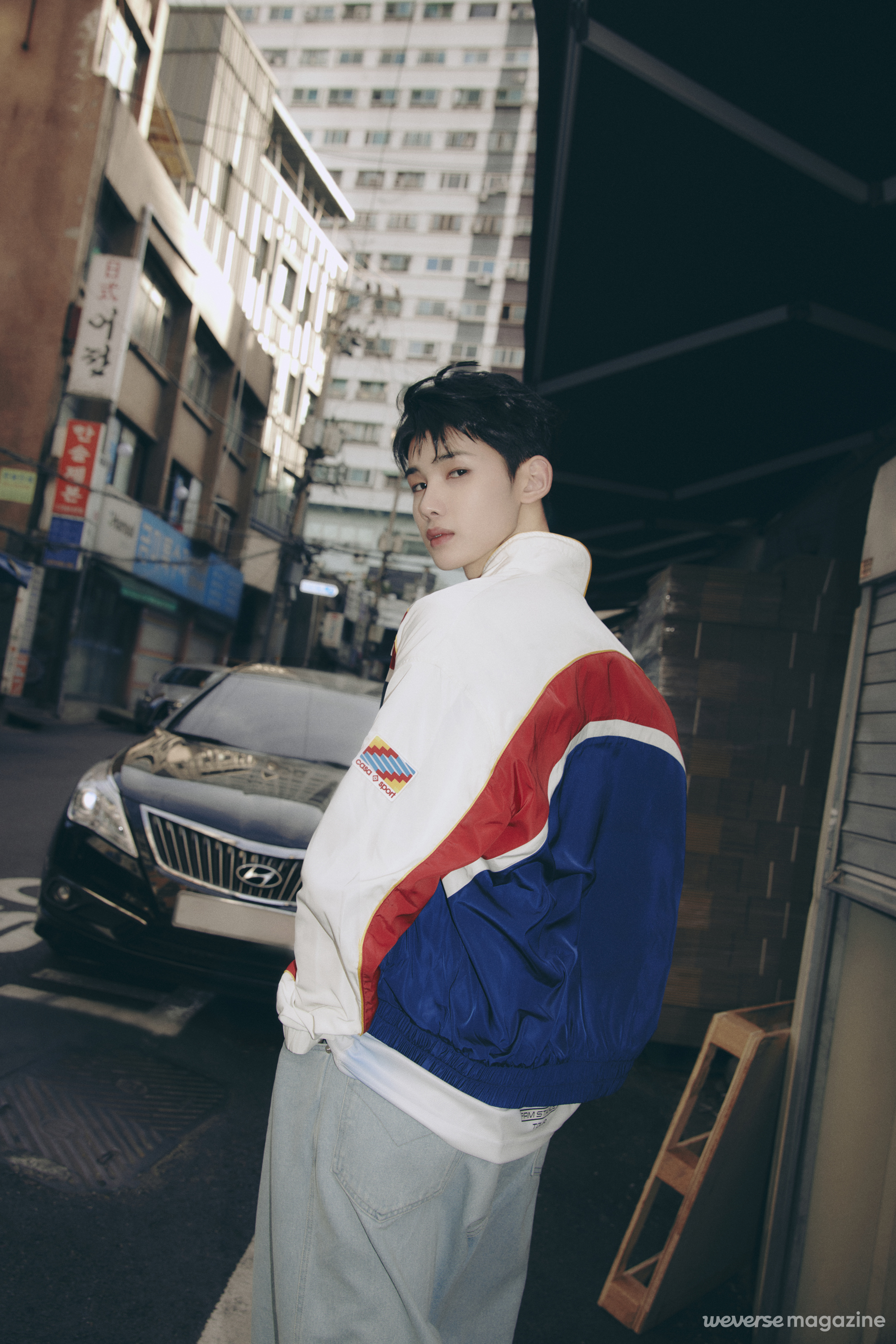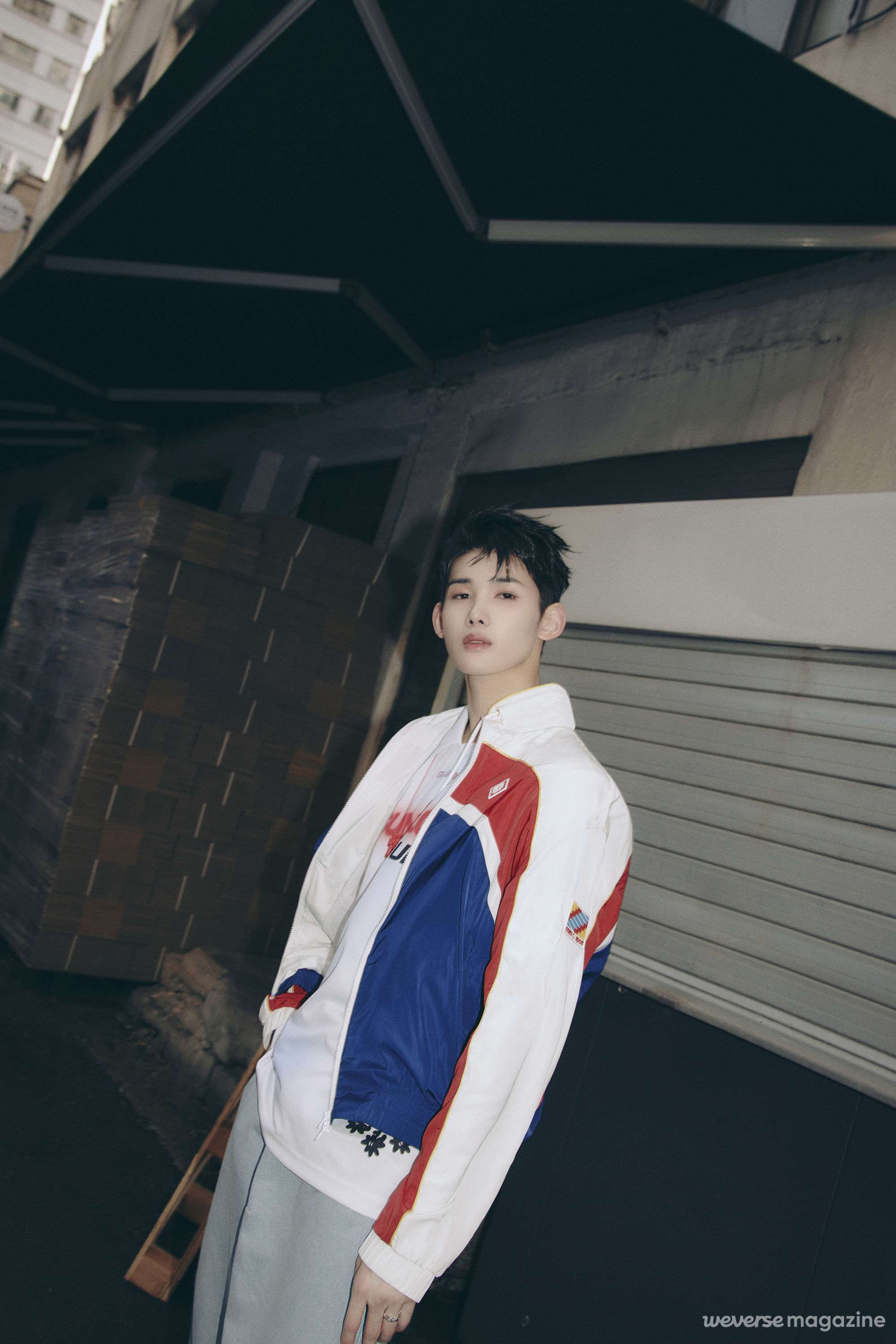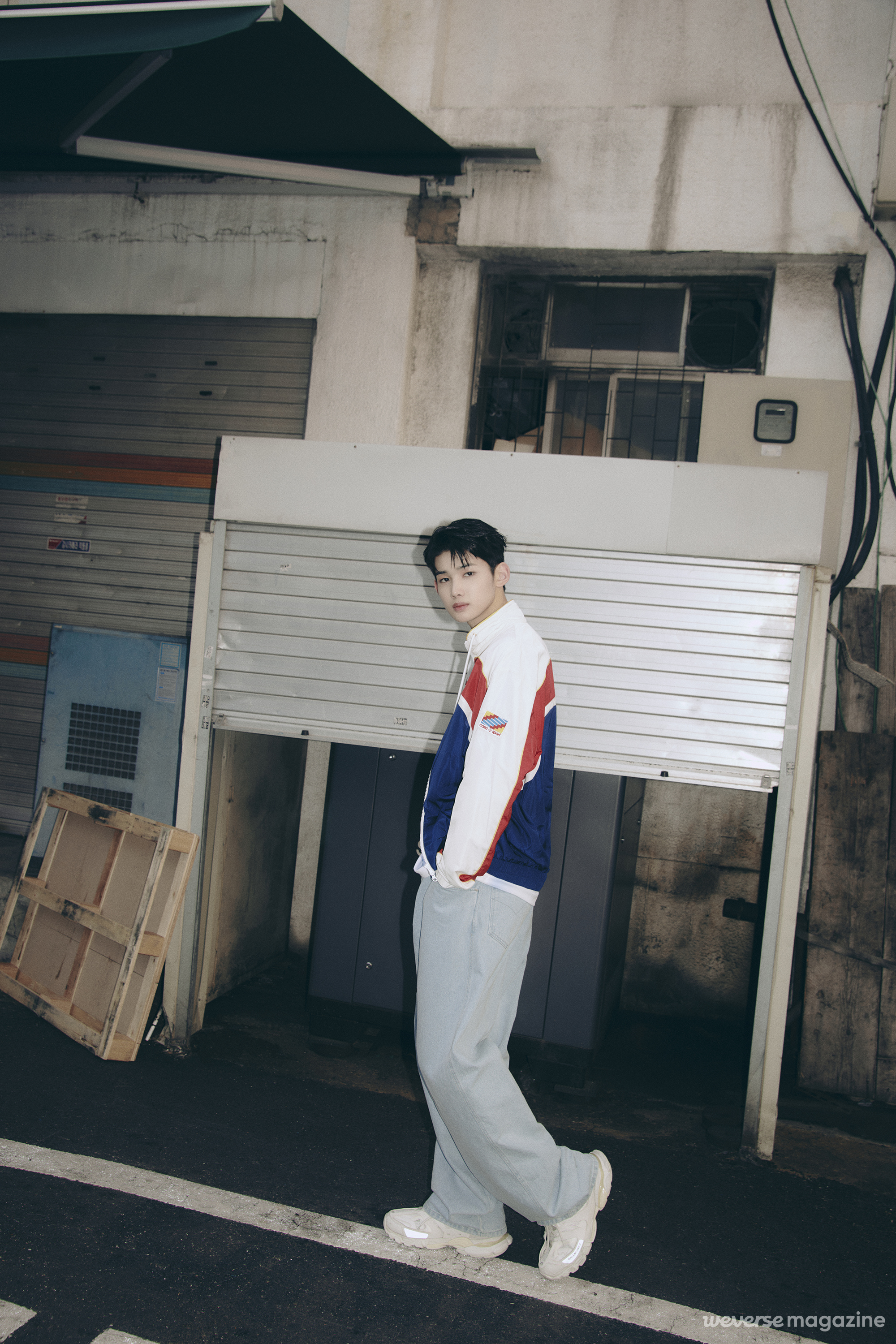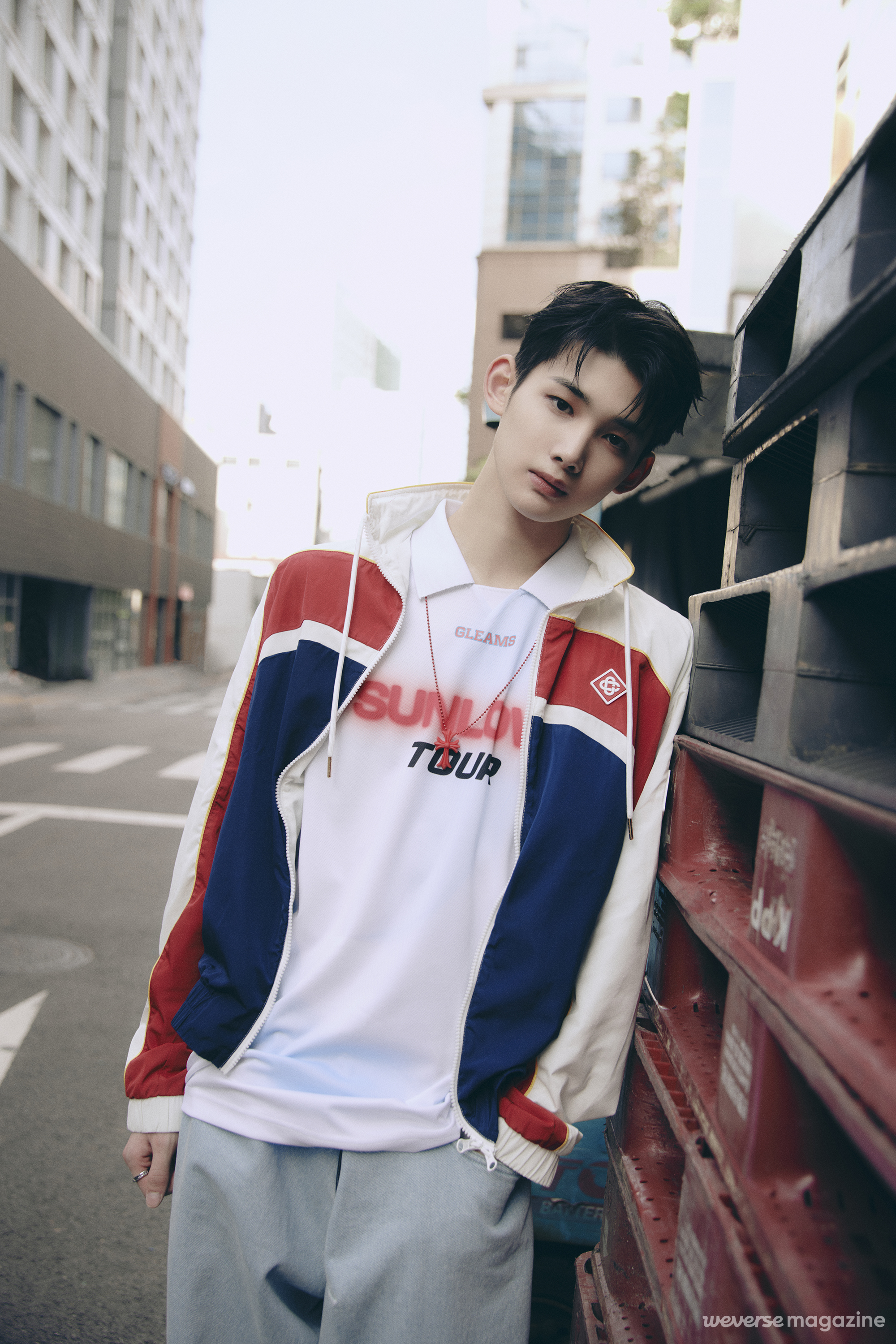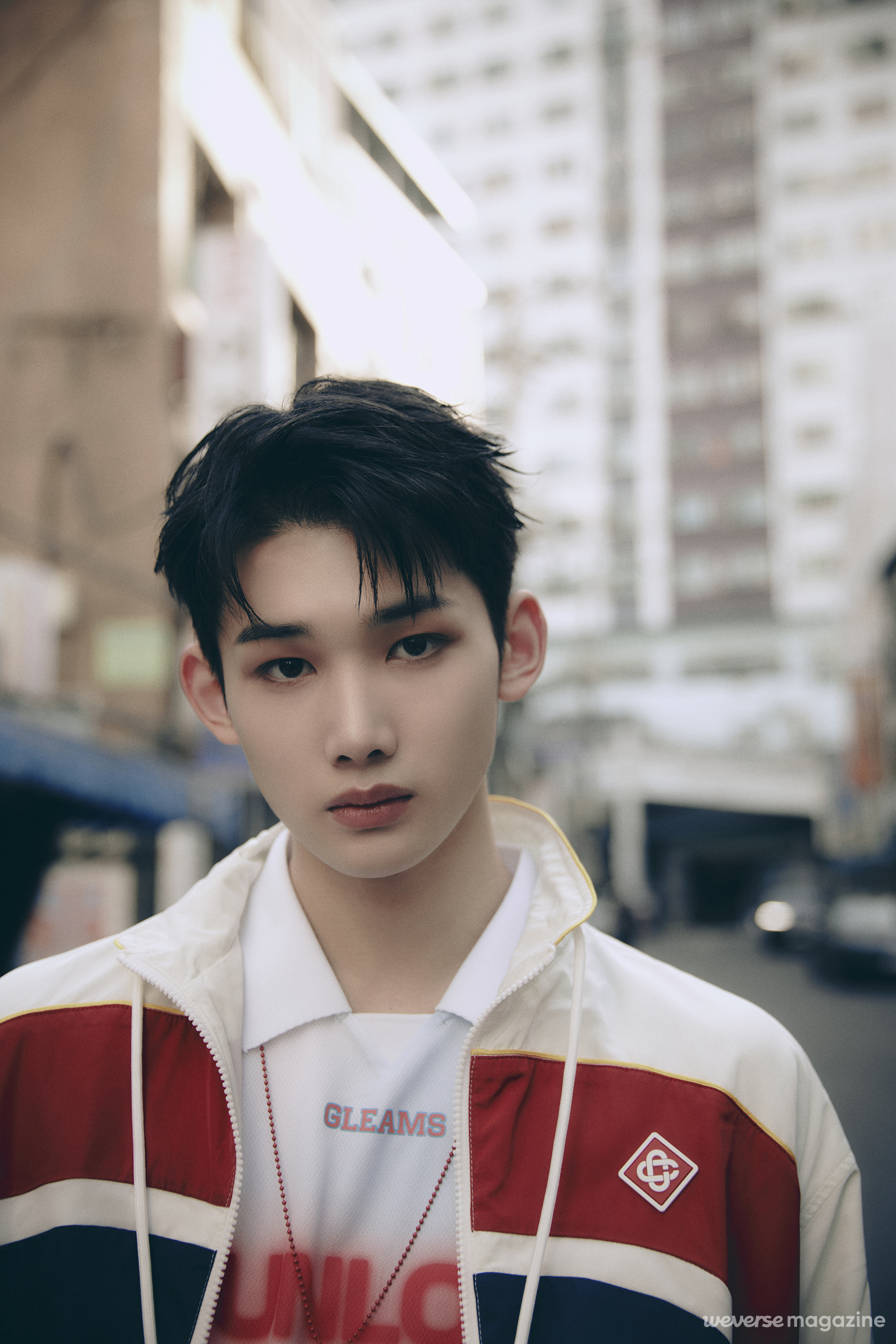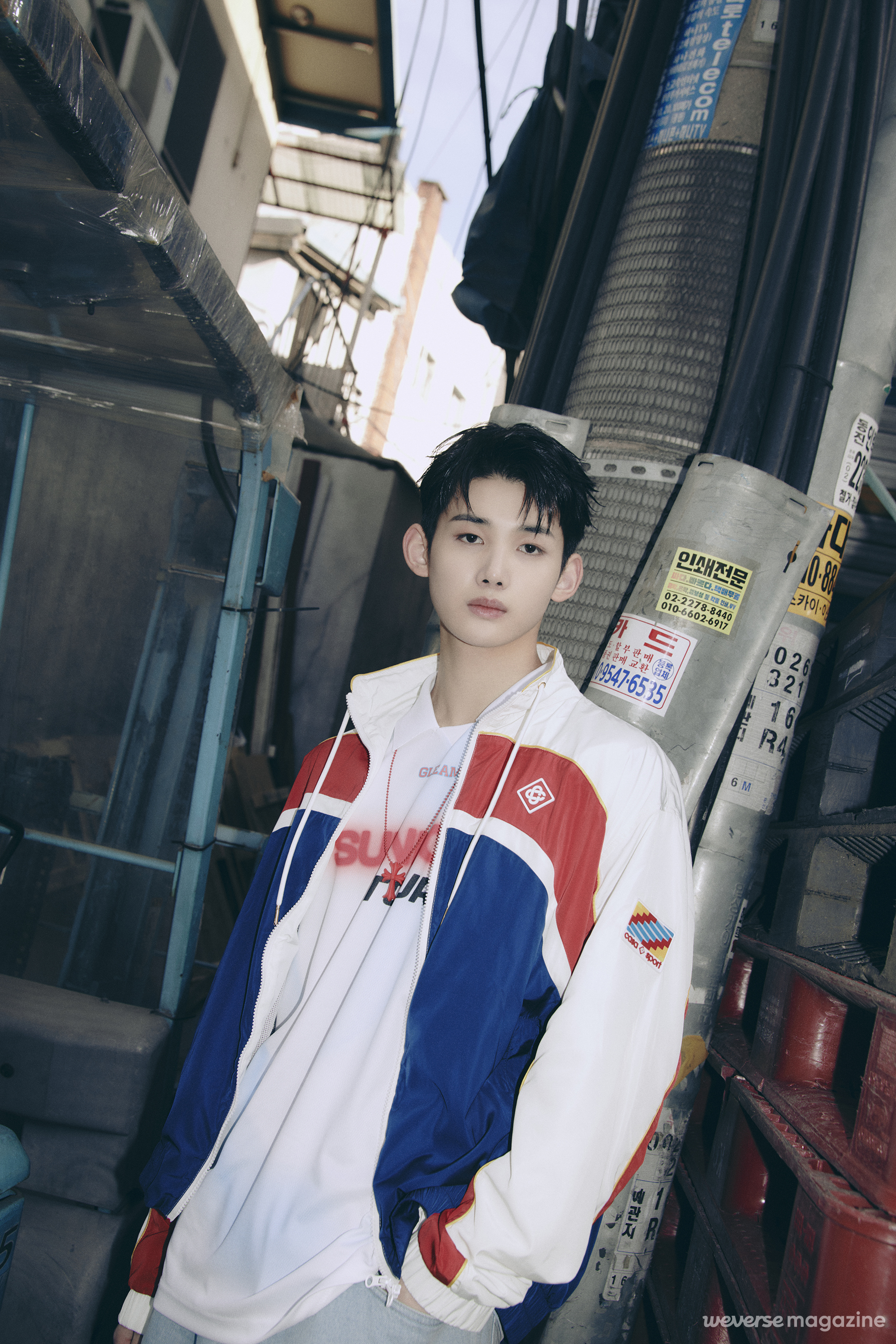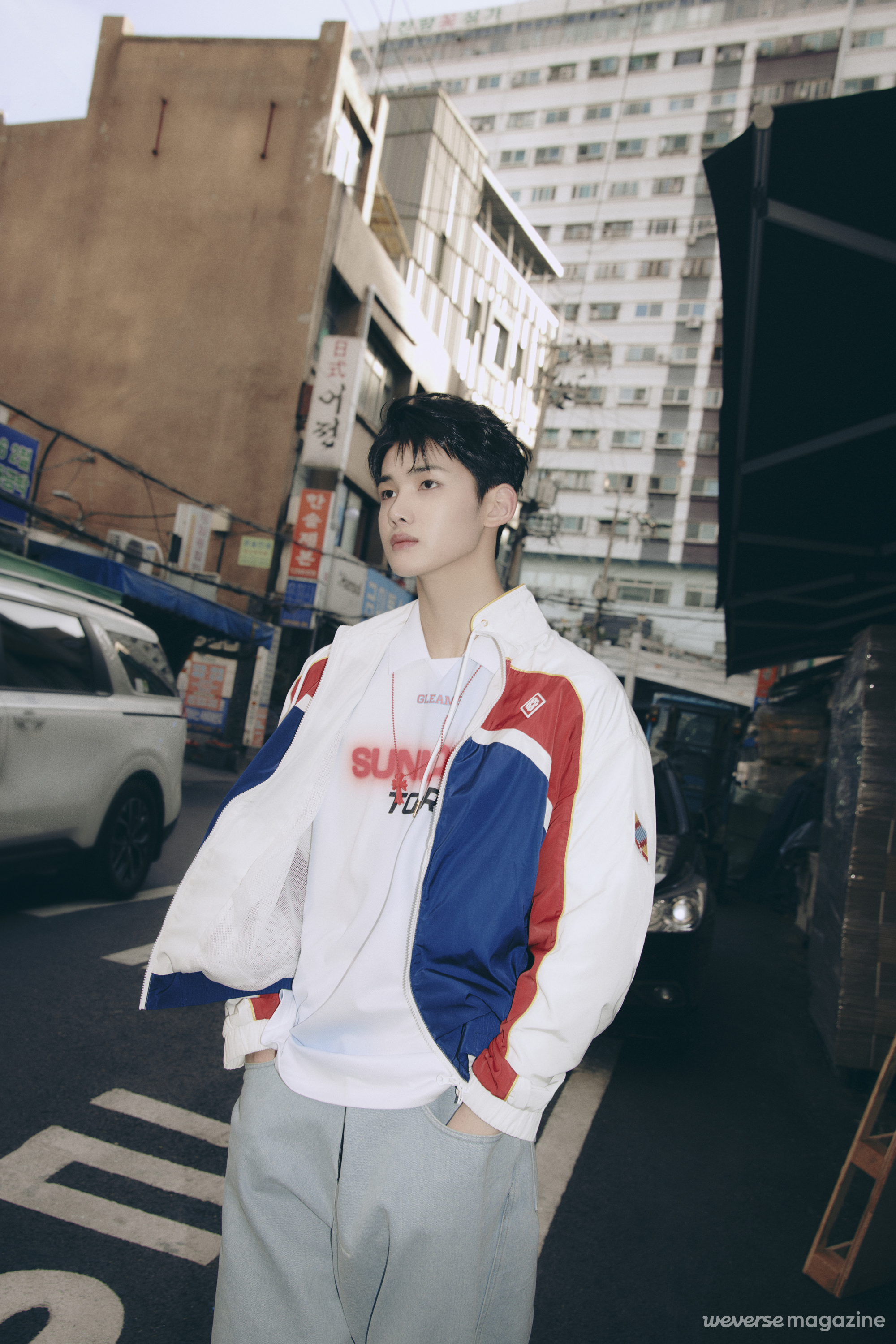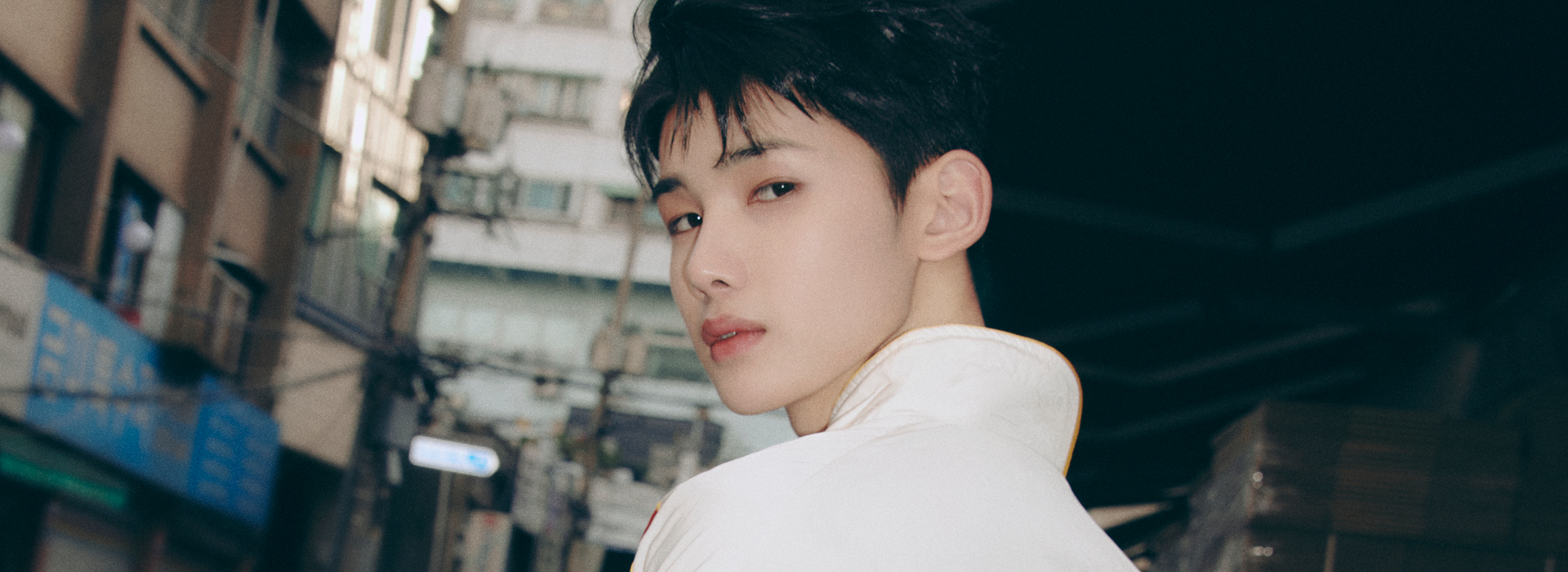
INTERVIEW
JO: “So I think to myself every day, I may not be perfect, but at least I can give it all I've got. ”
&TEAM First Howling: WE comeback interview
2023.07.01
JO loves the series SLAM DUNK, and he has the beauty of Kaede Rukawa and the passion of Hanamichi Sakuragi.
I saw the THIRSTY concept clip. The image of you graffitiing in shorts was youth incarnate. (laughs)
JO: I wasn’t actually doing it—just pretending. (laughs) The concept behind the album is finding something, so while I pretended to draw I imagined what could be there, like a plane. We’re in the practice studio every day so I was just happy to get out for the day.
You had really short hair in the video but it’s a little longer now.
JO: And yet it’s still the shortest I’ve had it since elementary school. It’s so easy to wash now. (laughs)
You must have had short hair when you were on the basketball team. Why did you join the basketball team even though your dream was to be a soccer player initially?
JO: I was influenced by my friend and also by SLAM DUNK, one of my favorite anime.
Wow, SLAM DUNK was so influential that it changed your favorite sport. (laughs)
JO: When I became a trainee I still thought I looked like Hanamichi. It was like the character was trying to tell me that I would be able to debut as long as I worked hard at it, just like how he worked his way to the nationals even without lots of experience. I’m also into the word “grit” lately so I’m getting everyone to say that about me. The word oozes passion and charisma, just like Hanamichi does.
Well, Hanamichi started playing basketball after Haruko asks if he likes it. How did you end up becoming a trainee?
JO: I was scouted at a contest for people who dream of being a model or actor. At the time I had never sung or danced so I even wrote a letter to the organizer about how passionate I am, saying, “I still have a long way to go, but I’m going to work really hard.” I was a little surprised when I made it. (laughs)
“I will work really hard”: That’s such a “you” thing to say—like the time you said that you’d keep on practicing even if the world was going to end tomorrow. (laughs)
JO: Now I concentrate on practicing until I can incorporate all the feedback both the teachers and the other members gave me on the same day. We all practice late into the night. I might want to keep going the next day, but if there’s a schedule then we can’t. That’s why I have to concentrate on working until I can’t work any harder while I’ve still got time.
What are you hoping to achieve by working until you can’t work any harder?
JO: I don’t think I occupy a defined position within the group or have my own specialty yet so I’m trying to make that happen. And isn’t it better for your growth if you keep telling yourself to push harder so you will catch up to people who are doing better? I’m learning a lot about dancing, singing and teamwork from K so that I can catch up with the other members like him and FUMA who aren’t just good at dancing but at singing too. And of course I need to look good on stage, so I can’t be lagging behind other members or it would be distracting for LUNÉ. That’s why I’m doing my best to catch up with the members who are excelling.
You’ll inevitably end up comparing yourself to the others if you’re trying to catch up with them. It must be hard to be patient and advance at your own pace under such pressure.
JO: I’m a little slow to memorize things or develop muscle memory so I have to keep repeating until it becomes ingrained in me. Knowing that, I can keep going. And not only did my singing and dancing get much better from &AUDITION - The Howling, but I learned a lot about teamwork, too. I was used to practicing alone up to that point, but I found out how important it is to stay in step with your group and prioritize teamwork over yourself.
The part of the “FIREWORK” choreography where the other members hold you up with their legs shows that teamwork in full force.
JO: At first I was worried for them because they have to lift me up with their legs from all sides, even though the audience can’t see it from the front. I also had to think about how to make that part look cool. (laughs) But it works out because we do it together. It’s important for that song to make sure every detail of every movement and hand gesture is perfect from start to finish. It’s a tough choreography and it was important for all nine of us to practice together to keep in sync.
Not only do you have to pay attention to the movements but also the subtle emotional details. “FIREWORK” is a happy song, but you have to express an emptiness that not even the person whose perspective the song is written from doesn’t quite understand yet.
JO: Parts of the song feel lonely and sad, but there are also happy parts, so it was important to split up the emotions — laugh and be relaxed when it’s happy but also come across as sadder for the not-so-happy parts. So for the recording I practiced not only the basics but also putting emotions into the song. I paid attention to the details second by second that I had missed when we were practicing as a group, and took time to think over the feedback I got after every practice. So if you compare that song to our older ones you can tell the emotion comes across better now. Even the other members told me I sound like I got better somehow. (laughs)
Those details should come across even more clearly in close-up “fancams” from music shows now that you’re gearing up for promotions in Korea.
JO: I want to look good when we shoot videos intended for LUNÉ like STUDIO CHOOM. (laughs) So I’ve been watching a lot of fancams of HOSHI from SEVENTEEN, NI-KI from ENHYPEN and all of BTS and trying to figure out where and how I can improve.
What kind of improvements do you feel you need to make?
JO: I think the most important thing to being on stage is staying relaxed but I’m not skilled or experienced enough yet to be perfectly relaxed. Top-level, world-famous artists like BTS can give you goosebumps when they perform. I feel like it’d be so cool if I could be like them and develop myself to the point where people don’t have to point to any one thing to know I’m amazing—they could just feel it.
What drives you to keep improving?
JO: When someone pays me a compliment I’m motivated to work even harder because I know I can improve if I try. . I feel more certain that I’ve improved when people can tell just by looking at me than me just feeling like it, so it makes me think I’ve improved a bit whenever LUNÉ tells me I have.
You’re quick to notice yourself changing, but slow to notice that the “psychometric test” you were taking that one time was actually part of a prank. You didn’t even notice the crew member had changed. (laughs)
JO: I couldn’t say anything because I thought I might be seeing things, not that the person had actually changed. But it turned out my hunch was right and I wasn’t seeing things after all, so I was relieved and could keep my composure.
That video was shot in Korea, so in a way, it’s kind of like a trailer for your upcoming promotion in Korea. I heard it only took you five minutes to pack before you came.
JO: It wasn’t actually five minutes. Maybe 10? (laughs) I was sure NICHOLAS would take a long time to pack because he has so many clothes. I didn’t have that many clothes or things to pack though. I already keep everything I need in my backpack.
What do you usually have in your backpack?
JO: I’ve got a razor, nail clippers, a toothbrush, clothes for practice, Korean textbooks—although I’m not sure I’ll use them—and some scripts that I don’t even know what they are—I have them with me just in case. And some snacks, too.
You must get singled out by MAKI, the cleaning leader, for a special treatment. (laughs)
JO: Speaking of which, one time he suddenly came into my room at two in the morning and said, “I’m cleaning up,” then got started. (laughs)
I bet he got everything nice and organized. What’s it like living together?
JO: We don’t change roommates much now since we’re always busy going back and forth between Korea and Japan, but right after we first debuted we did it soro-soro.
Oh, you mean you talked seoro-seoro before changing?
JO: Ah, it’s Japanese: “soro-soro.” (both laugh) We changed anytime we felt like it. Living together is fun. We regularly get everyone together after practice and party at night. It’s really just eating snacks and talking, but I like snacks. (laughs)
You like snacks? (laughs) You got some for your birthday, right?
JO: I am always snacking. Gummies are a thing in our home these days so I eat two packs of fruit gummies every night.
So gummies are trending with the group?
JO: They’re trending for me. (laughs)
It’s your own little trend. (laughs) But you said on TikTok before that “rice is the best.” I guess rice never goes out of style. (laughs)
JO: It’s been a habit of mine to eat plain food ever since I was young. I like rice, and I also like udon. Oh, I like sukiyaki too, even though it’s not exactly plain. (laughs) For food in Korea, cheese jjimdak is number one. There’s lots of spicy food in Korea but cheese jjimdak tastes like my mom’s cooking. And I’ve gotten much better at handling spicy food now.
You love eating and you asked LUNÉ to eat good meals with you every day. That makes the message even more special.
JO: I saw it makes LUNÉ happy when they see me having a good meal, so I thought they’d be even happier if we ate together. I thought it would be nice if we could do something casual like that together.
What does LUNÉ mean to you?
JO: LUNÉ is my source of energy. They leave comments saying they get energy from me, but it’s really the other way around. LUNÉ’s energy, love and support are what keep me going. So I’m really happy because I’m going to have a lot of opportunities to meet Korean LUNÉ for the first time and I’ll be able to show them how I talk in Korean instead of just Japanese. I want to get closer and more familiar with LUNÉ. I hope they’re looking forward to that as well.
Now that you mention it, your Korean’s improved so much that you’ve been using Korean throughout this whole interview. I heard you learned the phrase, “till my dying day.” (laughs)
JO: I don’t know why, but I picked that up from my vocal coach somehow. (laughs) I also just learned the word “smithereens.” It came up on a Korean variety show, which I watch to study Korean. It’s just something I learned randomly but I like the sound of it.
Since “smithereens” is used when something is broken into countless tiny pieces, did you ever have an experience where you felt like you were broken into smithereens?
JO: I’m a bit of a worrier so I feel like I can never slow down, which tires me out sometimes. But I can do it because I’m not alone—I have the other members with me. If I feel tired, it means they do too, and we can get through it knowing that we are all in it together.
Aren’t those times difficult?
JO: Yes. Because we’re not perfect yet. But the only option is to keep working hard. If I want to improve myself and show LUNÉ what kind of artist I can be, I have to keep going. They leave comments saying that seeing me trying so hard gives them the energy to get through the day, and seeing the way I work toward self-improvement has an impact on other people too means I can’t help but work hard.
So your efforts are for LUNÉ.
JO: Yes. So I think to myself every day. I may not be perfect, but at least I can give it all I've got. So that;s what I am going to do.
Credit
Article. Oh Minji
Interview. Oh Minji
Visual Director. Jeon Yurim
Coordinator. Lee Yejin
Visual Creative Team. Jang Yeaseul, UEDA SAEKO
Photography. LESS / Assist. Lee Sujeong, Park Sunseok, Jeon Junseo
Hair. Lim Jungho, Kim Minyoung, Kim Minwook
Makeup. Baek Hyuna, Lee Jimin
Stylist. Kim Beungkyu
Artist Protocol Team. Song Byeongcheon, SATOH MANABU, MOCHIZUKI KENTA, MATSUMOTO CHIHIRO

Weverse Magazine

JO:“我每天都在想,就算不可能完美,幸好还能全力以赴,所以我要尽最大的努力”
&TEAM 《First Howling:WE》回归访谈

Weverse Shop
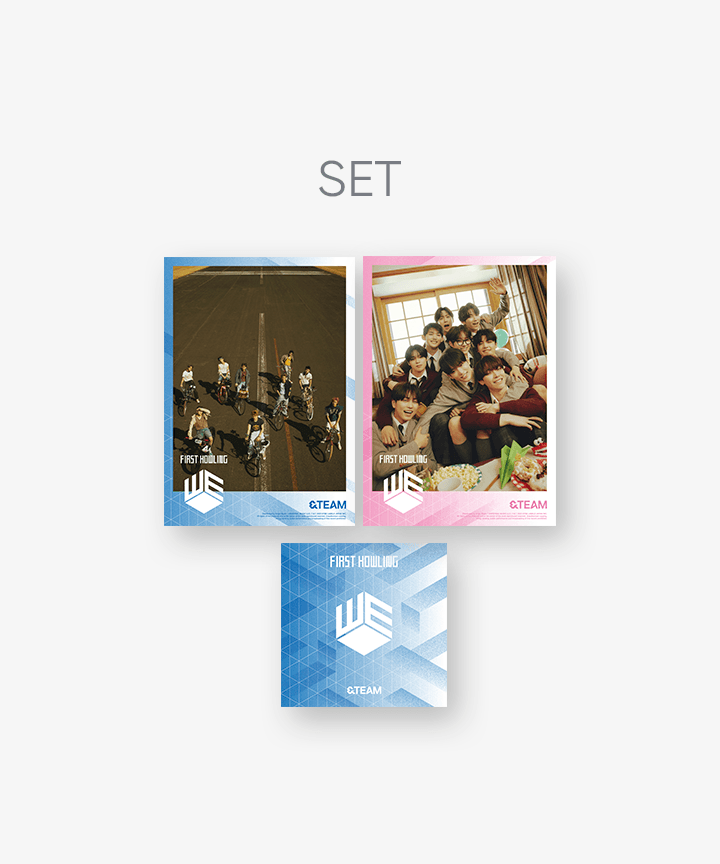
『First Howling : WE』
Copyright © Weverse Magazine. All rights reserved.
Unauthorized reproduction and distribution prohibited.
Unauthorized reproduction and distribution prohibited.
Read More
- FUMA: “I’ll never let this feeling fade”2023.06.26
